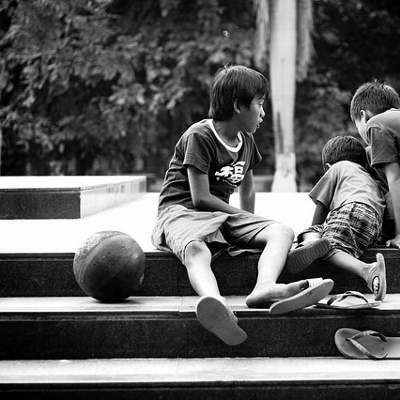 The Tween years are the time when children start taking risks. Some risks, like cutting school or smoking cigarettes, are always bad. But there are good risks, too. Like trying out for the school play or starting a club after school. That sort of leap of faith may result in great things. Or it may not. “Good†risks don’t always pan out. Swinging for the fence and falling short isn’t necessarily bad. Sometimes the reward is in the trying.
The Tween years are the time when children start taking risks. Some risks, like cutting school or smoking cigarettes, are always bad. But there are good risks, too. Like trying out for the school play or starting a club after school. That sort of leap of faith may result in great things. Or it may not. “Good†risks don’t always pan out. Swinging for the fence and falling short isn’t necessarily bad. Sometimes the reward is in the trying.
Tweens are caught between two worlds in so many ways. Taking risks is just another example of the life of that concept on display in the life of a Tween. Tweens are reaching a point in their lives where they want to break away from the safety of their family and try… something. It may be grand. It may be small. It may be clever or it may be patently stupid. You daughter is going to try to spread her wings during her Tween years. You can either sit idly by as she chooses a path all her own or you can subtly and lovingly guide that rebellious energy into an endeavor worth the undertaking.
The flip side of that desire to branch out is a growing sense of social norms and the pursuit of acceptance within social groups. A boy of eleven or twelve wants to be a rebel, an outsider, but only within the confines of that which falls into his peer group’s favorable view of what that entails. Those conflicting desires are what lead so many Tweens to rebel in negative ways. He only knows the way it is done in his family, so the first rebel without a clue that he encounters in middle school seems like a pretty good role model to break that mold. Unfortunately, that is usually that last example that a young man should be following and can lead to all manner of trouble down the road.
Parents may be tempted to clamp down on that influence by cutting off that risk-taking instinct in their children. That temptation tends to lead to only conflict within the home and hinders rather than helps the maturation process that needs to take place during Tweenhood. Children need to take risks. That’s how they grow. No risk means no reward. Cutting off our Tween’s natural inclination toward risk can backfire. If she actually learns the lesson too well, it could cut her off from joyful opportunities down the road. If all risk is bad, why even take a shot at the All-Region Band? Why not just play it safe and stay at home playing video games all day?
It is a delicate balance. Tweens need to learn to take risks but make sure that the risks they take are leading toward the right kind of reward. It is our job as parents to counsel them, even when they don’t want to hear it – especially when they don’t want to hear it. That’s when Tweens need us the most.










